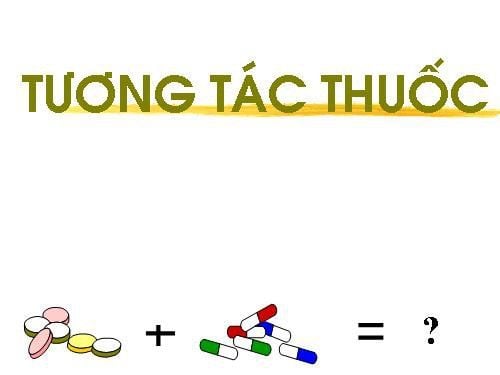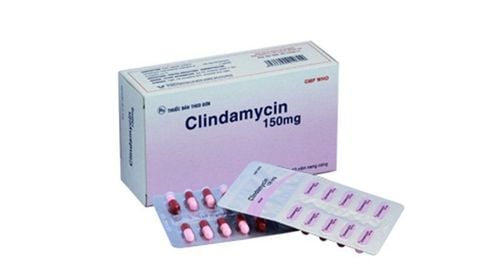This is an automatically translated article.
Some types of birth control pills work well if used together. Therefore, if you want the pill to have the best contraceptive effect, you need to avoid taking some of the following drugs simultaneously.
1. Interactions with birth control pills
When you take two or more medicines at the same time, the effects of one drug may be altered by the other. This is called a drug interaction. If this happens while you're on birth control pills, you'll need to use additional birth control methods (such as condoms) or change to a different method of birth control.
Hormonal contraceptives that may be affected by other medications include:
Combined oral contraceptives; Progestogen-only birth control pills; Contraceptive patch ; IUDs ; Implant. Some hormonal contraceptives can alter the effects of other medicines, such as the epilepsy drug lamotrigine and the immunosuppressant ciclosporin. You may be advised to change the way you take your pills or use a different method of birth control.
2. Medicines that reduce the effectiveness of birth control pills
If diarrhea occurs as a side effect of certain medications, it may affect the absorption of combined oral contraceptives or progestogen-only pills. An example of this is the weight loss drug orlistat.
Other drugs can affect the hormones in birth control pills if taken at the same time. This can happen with medicines used to reduce bile acid levels, such as cholestyramine.
There are certain drugs that can increase the enzymes in your body, also known as "enzyme inducers". Enzyme inducers increase the metabolic rate of some birth control hormones and therefore decrease the levels of these hormones in your blood. This makes contraception less effective. Enzyme inducers that can affect hormonal contraception include:
rifampicin-like antibiotics : You don't have to worry about taking other antibiotics because doctors usually prescribe antibiotics to treat them. Treats all types of bacterial infections such as pneumonia, acne and urinary tract infections (UTIs). Common antibiotics include penicillin and amoxicillin. So far, the only antibiotic that studies have shown interferes with birth control is rifampin, a drug used to treat tuberculosis. Rifampin causes menstrual irregularities, increasing the risk of pregnancy even with proper birth control. In addition to rifampin, it is probably safe to take birth control pills at the same time as antibiotics without using a backup method. Certain medications used to treat epilepsy: Some drugs increase the breakdown of hormones in birth control pills. That can make them less effective. These drugs include: Carbamazepine, Felbamate, Oxcarbazepine, Phenobarbital, Phenytoin, Primidone, Topiramate. Be sure to use another form of birth control (such as an IUD, diaphragm, or condom) if you take anti-seizure medications. In contrast, oral contraceptives have not been shown to affect the effectiveness of antiepileptic drugs. Modafinil (Provigil): This is a stimulant commonly used to treat symptoms of sleep disorders such as narcolepsy and sleep apnea. Studies show it reduces the effectiveness of birth control pills Use another form of birth control while you are using modafinil (Provigil) and for one month after you stop using modafinil. Certain antiretroviral drugs used to treat HIV: Some HIV medicines can interfere with the effectiveness of birth control pills, such as Darunavir (Prezista), Efavirenz (Sustiva), Lopinavir/ritonavir (Kaletra), Nevirapine (Viramune) Fungicides: The two main ones to watch out for are griseofulvin and ketoconazole. Griseofulvin is used to treat skin infections such as tinea pedis and itchiness. Ketoconazole is mainly used when other antifungal drugs do not respond to treatment. St John's wort (herbal medicine): Some people use this medicine to treat mild to moderate depression and sleep disorders. Some studies have shown that women who take oral contraceptives and St. John's wort at the same time have higher rates of sudden bleeding and increased breakdown of estrogen in their bodies, an indication that birth control methods may be harmful. may not work as well as expected.

Các loại thuốc khác có thể ảnh hưởng đến nội tiết tố trong thuốc tránh thai nếu uống cùng lúc
3. Be careful when taking birth control pills with other drugs
If you need to start taking another medicine while you are using hormonal contraception, make sure your doctor or pharmacist knows that you are using this type of birth control. They can advise you on whether the other pill will make your birth control less effective. Your healthcare provider may recommend that you use an alternative or additional form of birth control while taking another medication.
If you get pregnant while taking hormonal birth control, it usually doesn't affect the health of you or your unborn baby. But you should still tell your doctor right away if you suspect you may be pregnant.
Please dial HOTLINE for more information or register for an appointment HERE. Download MyVinmec app to make appointments faster and to manage your bookings easily.













